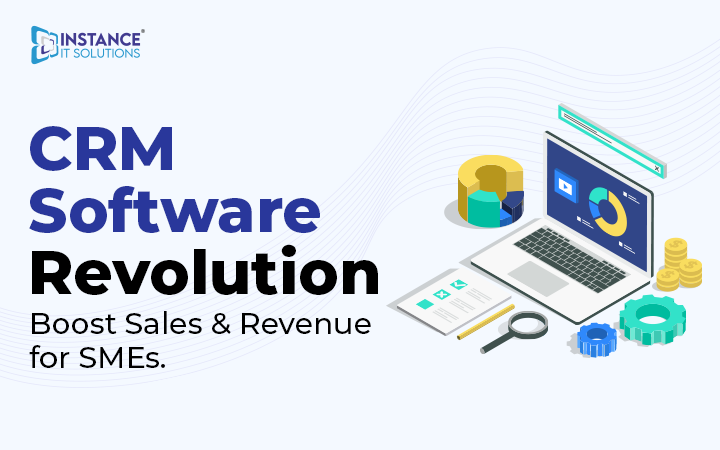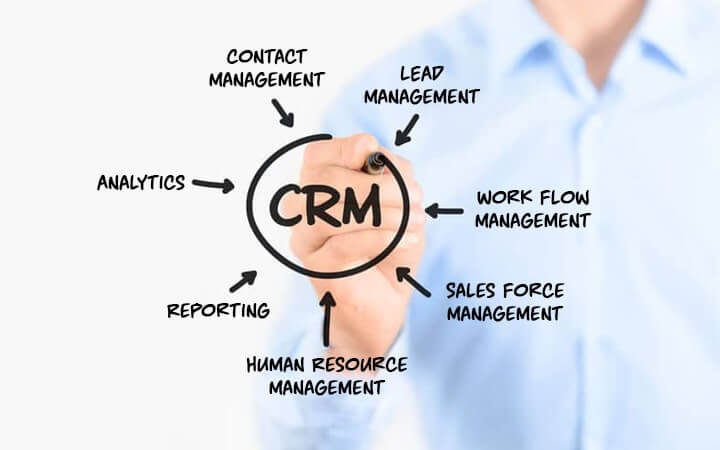CRM Revolution: CRM Software to Increase Sales and Revenue
-

-
Shivendra Saxena
02 Apr, Tue
Content
-
Introduction -
Understanding The Needs of SMEs And How CRM Software Helps Fulfill Them -
Streamlining Sales Processes -
Increasing Profitability Through Data Analytics -
Improving Customer Relationship Management -
Enhancing Marketing Efforts -
Cost-Effectiveness Of CRM For SMEs -
Future Trends and Opportunities -
Conclusion -
Faq

Introduction
Discover the power of CRM software in boosting sales and profits for SMEs. Streamline operations, enhance customer relationships, and drive business growth efficiently.Â
Customer Relationship Management (CRM) software refers to a set of tools, technologies, and processes designed to manage, analyze, and optimize interactions between a business and its customers. It encompasses various aspects of customer engagement, including sales, marketing, and customer service, to enhance customer satisfaction, loyalty, and performance.Â
CRM software typically integrates and centralizes customer data, enabling businesses to gain insights into customer behaviors, preferences, and needs. It facilitates a holistic view of the customer journey, from the initial contact through the entire relationship, allowing organizations to tailor their strategies and offerings accordingly.
CRM software plays a crucial role for Small and Medium-sized Enterprises (SMEs) by offering several benefits that can significantly impact their operations and growth. One of the primary advantages of CRM for SMEs is the ability to build and maintain stronger relationships with customers. By centralizing customer information, businesses can personalize interactions, understand individual preferences, and provide more targeted services.Â
This personalized approach fosters customer loyalty and satisfaction. CRM systems streamline sales processes by automating tasks such as lead management, contact tracking, and sales forecasting. This efficiency allows SMEs to allocate resources more effectively, identify potential sales opportunities, and make informed decisions to drive revenue growth.Â
CRM software helps SMEs create targeted and personalized marketing campaigns based on customer data. By understanding customer demographics and behaviors, businesses can tailor their marketing efforts, resulting in more effective and cost-efficient campaigns.Â
For SMEs, delivering excellent customer service is often a key differentiator. CRM systems enable efficient handling of customer inquiries, complaints, and support requests. This leads to quicker response times, better issue resolution, and overall improved customer satisfaction.Â
Lastly, CRM software provides valuable insights through data analytics, enabling SMEs to make informed business decisions. By analyzing customer trends and behaviors, businesses can adapt their strategies, optimize operations, and stay ahead in a competitive market.Â
Understanding The Needs of SMEs And How CRM Software Helps Fulfill Them
Small and Medium-sized Enterprises often encounter various challenges in sales and profitability, including limited resources, intense competition, and difficulty in accessing markets.  These businesses struggle to establish a robust customer base and maintain consistent revenue streams due to constraints in manpower, budget, and infrastructure.Â
Efficient customer relationship management is crucial for SMEs as it directly addresses their challenges in sales and profitability. By prioritizing customer satisfaction and loyalty, SMEs can differentiate themselves from competitors, enhance brand reputation, and ultimately drive revenue growth. CRM helps SMEs understand their customers better, tailor products or services to meet their needs and deliver exceptional experiences that foster long-term relationships.Â
CRM software offers tailored solutions to address the pain points of SMEs in sales and profitability. It streamlines sales processes, automates repetitive tasks, and provides insights that enable more targeted marketing efforts. By centralizing customer data and facilitating efficient communication, CRM systems empower SMEs to optimize resource allocation, identify new opportunities, and maximize profitability.Â
 Additionally, CRM enhances customer service capabilities, leading to higher customer retention rates and increased lifetime value for SMEs. Overall, CRM serves as a strategic tool for SMEs to overcome challenges and thrive in competitive markets.Â
Streamlining Sales Processes
CRM software automates lead generation by capturing prospect information from various sources such as website inquiries, social media, and email campaigns.Â
It streamlines the process of tracking leads through customizable workflows, ensuring timely follow-ups and efficient lead nurturing. CRM systems enable SMEs to manage sales pipelines effectively by providing a visual representation of the sales process.Â
Businesses can track the progress of leads through different stages, identify bottlenecks, and allocate resources strategically to prioritize high-potential opportunities. This helps in forecasting sales, optimizing resource allocation, and maximizing revenue generation.Â
CRM tools enhance sales team productivity by centralizing communication, automating administrative tasks, and providing real-time access to customer information.Â
Sales representatives can focus more on building relationships and closing deals rather than on manual data entry or searching for relevant information. Features like calendar integration, task management, and mobile accessibility further facilitate seamless collaboration and efficient workflow management, ultimately boosting sales team performance.Â
Increasing Profitability Through Data Analytics
CRM data serves as a goldmine of information that SMEs can leverage for informed decision-making. By analyzing customer interactions, purchase history, and preferences stored in CRM systems, businesses gain valuable insights into consumer behavior and market trends.Â
This information helps in tailoring products or services to meet customer needs, optimizing pricing strategies, and identifying areas for improvement in sales and marketing efforts.Â
Informed decisions based on CRM data lead to enhanced operational efficiency, increased customer satisfaction, and ultimately, improved profitability for SMEs. CRM data analytics enable SMEs to identify cross-selling and upselling opportunities among existing customers.Â
By analyzing purchase patterns and customer preferences, businesses can suggest complementary products or services to customers, thereby increasing the average order value and maximizing revenue per customer.Â
This targeted approach based on CRM insights not only drives additional sales but also strengthens customer relationships by demonstrating an understanding of their needs and preferences. CRM analytics empower SMEs to forecast sales and revenue with greater accuracy. By analyzing historical sales data, market trends, and customer behavior patterns, businesses can make informed predictions about future sales performance.Â
This enables proactive planning, resource allocation, and goal setting, ensuring that SMEs are well-prepared to meet revenue targets and maximize profitability.Â
Moreover, CRM analytics facilitate continuous monitoring and adjustment of sales forecasts based on real-time data, allowing businesses to adapt quickly to changing market conditions and optimize their sales strategies for sustained growth.Â
Improving Customer Relationship Management
CRM systems offer SMEs a centralized customer database, consolidating information from various touchpoints such as interactions, purchases, and preferences.Â
This centralized database provides a comprehensive view of each customer, facilitating better insights into their behavior, needs, and preferences. Businesses can analyze this data to understand customer trends, identify patterns, and tailor their strategies, accordingly, leading to more effective decision-making and customer relationship management. With CRM, SMEs can personalize communication and engagement with customers based on the insights gathered from the centralized database.Â
By segmenting customers according to their preferences, purchase history, or demographics, businesses can deliver targeted and relevant messages through various channels such as email, social media, or personalized promotions.Â
This personalized approach enhances customer experience, fosters stronger relationships, and increases the likelihood of customer retention and repeat business. CRM helps SMEs build long-term customer loyalty by enabling personalized interactions, efficient problem resolution, and consistent engagement.Â
By consistently delivering exceptional experiences based on customer preferences and needs, businesses can establish trust and loyalty among their customer base. Moreover, CRM allows businesses to track customer interactions and proactively address issues or concerns, demonstrating a commitment to customer satisfaction and fostering long-term relationships that drive repeat business and advocacy.Â
Enhancing Marketing Efforts
CRM systems enable SMEs to create targeted marketing campaigns by leveraging customer data for segmentation. By categorizing customers based on demographics, purchase history, or behavior, businesses can tailor their marketing messages to specific audience segments.Â
This personalized approach increases the relevance of marketing communications, enhances engagement, and improves the effectiveness of campaigns, ultimately driving higher conversion rates and ROI. CRM integration with marketing automation tools streamlines marketing efforts by automating repetitive tasks like email marketing, lead nurturing, and campaign management.Â
This integration ensures seamless communication between sales and marketing teams, improves efficiency and allows businesses to deliver timely and relevant messages to prospects and customers. By automating workflows and processes, SMEs can optimize resource allocation, improve productivity, and focus on strategic initiatives to drive business growth.Â
CRM data provides valuable insights for analyzing marketing ROI by tracking customer interactions, campaign effectiveness, and conversion rates. Businesses can measure the impact of marketing efforts on sales revenue, customer acquisition, and retention using CRM analytics. This enables SMEs to identify high-performing marketing channels, allocate budgets effectively, and refine their strategies to maximize ROI.Â
By leveraging CRM data for marketing analysis, businesses can make data-driven decisions, optimize marketing investments, and achieve better results from their marketing efforts.Â
Cost-Effectiveness Of CRM For SMEs
SMEs can explore various affordable CRM solutions tailored to their budget constraints. Many CRM providers offer flexible pricing plans, including scaled-down versions with essential features suitable for small businesses.Â
Additionally, open-source CRM platforms provide cost-effective options, allowing SMEs to customize and scale the CRM system according to their specific needs and budget. To assess the return on investment (ROI) of CRM implementation, SMEs can calculate the cost savings and revenue generated as a result of CRM adoption.Â
Factors to consider include reduced administrative costs, improved sales efficiency, increased customer retention, and revenue growth attributed to better customer relationship management. By comparing these benefits against the initial investment and ongoing CRM expenses, businesses can determine the ROI and evaluate the cost-effectiveness of CRM implementation. Â
While there may be upfront costs associated with CRM implementation, SMEs can realize significant long-term cost savings and benefits. Streamlined sales processes, improved marketing efficiency, and enhanced customer relationships leading to reduced operational costs, increased productivity, and higher revenue generation over time.Â
Â
Moreover, by fostering customer loyalty and retention, CRM contributes to sustainable business growth, resulting in a positive impact on profitability and overall business success.Â
Future Trends and Opportunities
Future Trends and Technologies of CRM in 2024 indicate that the focus for Small and medium enterprises (SMEs) will be on increased accessibility, scalability, and customization. Cloud-based CRM solutions are projected to maintain their popularity, providing SMEs with flexible and cost-effective options for managing customer relationships. Accessibility will be paramount, ensuring SMEs can access their CRM systems anytime, anywhere, and from any device. Scalability will also be vital, enabling CRM platforms to grow alongside businesses without substantial upfront investments.Â
Moreover, customization will play a significant role in meeting SMEs' unique needs, allowing tailored CRM solutions to optimize business processes and workflows efficiently.
Additionally, mobile CRM applications will become more sophisticated, allowing SMEs to access CRM data and tools anytime, anywhere. Predictive analytics and artificial intelligence (AI) will play a significant role in the future of CRM for SMEs.
These technologies will enable businesses to anticipate customer needs, personalize interactions, and automate decision-making processes. AI-powered chatbots and virtual assistants will enhance customer service capabilities, while predictive analytics will help SMEs forecast trends, optimize marketing campaigns, and identify growth opportunities.
The future of CRM holds promising benefits for SMEs, including improved customer insights, enhanced automation, and increased efficiency. However, challenges such as data privacy concerns, integration complexities, and the need for continuous training and upskilling of employees in new technologies may arise. Overcoming these challenges will be crucial for SMEs to fully leverage the potential of future CRM trends and opportunities.
Conclusion
CRM software offers Small and Medium-sized Enterprises a powerful tool to boost sales and profits by improving customer relationship management. Through centralized customer databases, personalized communication, and streamlined sales processes, CRM enhances efficiency, increases customer satisfaction, and drives revenue growth for SMEs.Â
Investing in CRM is essential for SMEs seeking sustainable business growth. By prioritizing customer relationships and leveraging CRM technology, businesses can differentiate themselves in competitive markets, optimize sales processes, and maximize profitability. CRM enables SMEs to understand customer needs, tailor offerings, and deliver exceptional experiences that foster long-term loyalty and drive sustainable growth.Â
In conclusion, SMEs are encouraged to explore CRM solutions to unlock their full potential for growth and success. By embracing CRM technology, businesses can gain valuable insights, improve operational efficiency, and build lasting relationships with customers. As the business landscape continues to evolve, investing in CRM will be instrumental for SMEs to stay competitive, adapt to changing market dynamics, and achieve their goals. Take action today to explore CRM solutions and position your SME for success in the future.Â
Â
In case you are looking for the ideal CRM solution for your SME, get in touch with Instance IT Solutions right away. We can help you succeed swiftly by optimizing your operations.Â
We are trusted by over 650+ clients.
Join them by using our services and grow your business.
Request a callbackRequest a callback



 Contact Us
Contact Us
